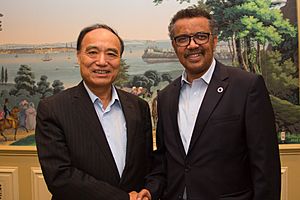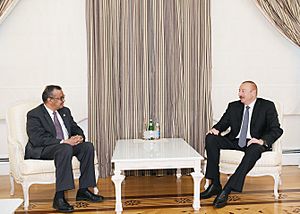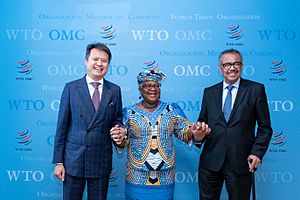Tedros Adhanom Ghebreyesus facts for kids
Quick facts for kids
Tedros Adhanom Ghebreyesus
|
|
|---|---|
|
ቴዎድሮስ አድሓኖም ገብረኢየሱስ
|
|
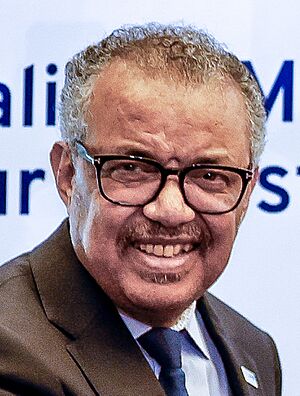
Tedros in 2024
|
|
| 8th Director-General of the World Health Organization | |
| Assumed office 1 July 2017 |
|
| Deputy | Zsuzsanna Jakab Michael Ryan |
| Preceded by | Margaret Chan |
| Minister of Foreign Affairs | |
| In office 29 November 2012 – 1 November 2016 |
|
| Prime Minister | Hailemariam Desalegn |
| Preceded by | Berhane Gebre-Christos (acting) |
| Succeeded by | Workneh Gebeyehu |
| Minister of Health | |
| In office 12 October 2005 – 29 November 2012 |
|
| Prime Minister | Meles Zenawi Hailemariam Desalegn |
| Preceded by | Kebede Tadesse |
| Succeeded by | Kesetebirhan Admasu |
| Personal details | |
| Born | 3 March 1965 Asmara, Ethiopia (present-day Eritrea) |
| Political party | Tigray People's Liberation Front |
| Children | 5 |
| Education |
University of Asmara (BS)
London School of Hygiene & Tropical Medicine (MS) University of Nottingham (PhD) |
| Signature |  |
| Scientific career | |
| Fields | Community health |
| Thesis | The effects of dams on malaria transmission in Tigray Region, northern Ethiopia, and appropriate control measures (2000) |
Tedros Adhanom Ghebreyesus (Tigrinya: ቴዎድሮስ አድሓኖም ገብረኢየሱስ, sometimes spelled ቴድሮስ ኣድሓኖም ገብረየሱስ; born 3 March 1965) is an Ethiopian public health official, researcher, diplomat, and the Director-General of the World Health Organization since 2017. He is the first African to become WHO Director-General, receiving an endorsement for the role by the African Union. Tedros played a role in the response to the Ebola virus epidemic, the COVID-19 pandemic, and the 2022–2023 mpox outbreak.
Prior to serving as Director-General, he held two high-level positions in the government of Ethiopia: Minister of Health from 2005 to 2012 and Minister of Foreign Affairs from 2012 to 2016. Tedros was included in Time's 100 Most Influential People of 2020.
Contents
Early life and education
Tedros was born in Asmara, Eritrea (at that time part of the Ethiopian Empire), to Adhanom Gebreyesus and Melashu Weldegabir. His family originated from the Enderta awrajja of Tigray. Tedros recalled that as a child he was very aware of the suffering and death caused by malaria. His younger brother died at the age of 3 or 4 years, possibly of a preventable disease like measles, which Tedros often discusses as a defining personal experience in regards to the need for global healthcare.
In 1986, Tedros received a Bachelor of Science degree in biology from the University of Asmara. He studied at the London School of Hygiene & Tropical Medicine and was awarded a Master of Science degree in immunology of infectious diseases from the University of London in 1992. In 2000, he earned a Doctor of Philosophy in community health from the University of Nottingham for research on the effects of dams on malaria transmission in the Tigray region.
Early career
In 1986, after his first degree, Tedros joined the Ethiopian Ministry of Health as a junior public health expert.
Tedros joined the Tigray People's Liberation Front. In 2001, Tedros was appointed head of the Tigray Regional Health Bureau. In 2003, he was appointed a State Minister (deputy minister) for Health, a post he held for just over a year.
Ethiopian politics
Minister of Health of Ethiopia (2005–2012)
In October 2005, Tedros was appointed Minister of Health of Ethiopia by Prime Minister Meles Zenawi of Tigray People's Liberation Front. At this time the Ethiopian health ministry faced challenges that included poverty, poor infrastructure, and a declining global economic situation; Ethiopia employed fewer doctors than the number of Ethiopian doctors working in the Chicago metropolitan area. A review published in Global Health Governance considered progress in health indicators during this period to be significant. The Health Ministry's activities from 2005 to 2008 were supported by US$1.9 billion in development aid, increased focus on links between community and centralized health systems, and less exclusive attention to HIV/AIDS and malaria. Tedros designed the health workforce "flooding" reform strategy that has resulted in the training and deployment of thousands of doctors, nurses, pharmacists, laboratory technologists and health officers. This program included the construction of 4,000 health centres, trained and deployed more than 30,000 health extension workers, and developed a new cadre of hospital management professionals as part of a Health Extension Program (HEP). A 2011 Demographic Health Survey suggests these efforts reduced Ethiopian infant mortality from 123 deaths per 1,000 live births in 2006 to 88 in 2011.
As Minister of Health, Tedros formed relationships with figures and organizations including former American president Bill Clinton, his Clinton Foundation and the Bill & Melinda Gates Foundation. In 2010 the US State Department named Ethiopia as one of the US Global Health Initiative Plus countries, providing the country with greater access to resources for public health projects.
Global health initiatives
During his time as Minister of Health of Ethiopia, Tedros was very active in global health initiatives. Ethiopia was the first country to sign a compact with the International Health Partnership. He was chair of the Roll Back Malaria Partnership (2007–2009), a member of the Programme Coordinating Board of UNAIDS from 2009 to 2010 and the Global Fund to fight AIDS, Tuberculosis and Malaria from 2009 to 2011 and co-chair of the Partnership for Maternal, Newborn & Child Health (2005–2009). He also served as a member of the Global Alliance for Vaccines and Immunization (GAVI) Board as well as the Institute of Health Metrics and Evaluation (IHME) and the Stop TB Partnership Coordinating Board. He was also a member of several academic and global health think tanks including the Aspen Institute and Harvard School of Public Health. He served as vice-president of the 60th World Health Assembly that was held on 14–23 May 2007. From 2008 until 2009, he was a member of the High Level Taskforce on Innovative International Financing for Health Systems, co-chaired by Gordon Brown and Robert Zoellick.
The Global Fund to Fight AIDS, Tuberculosis and Malaria
In July 2009, Tedros was elected board chair of The Global Fund to Fight AIDS, Tuberculosis and Malaria for a two-year term. In a profile published in April 2010, The Lancet reported that Tedros was "a household name at the Global Fund Secretariat" before his election as board chair where his leadership was regularly cited at the Global Fund that resulted in Ethiopia being named as an exemplary high-performing country.
Maternal and child health
Tedros oversaw a program introducing 30,000 health extension workers, focused on reducing maternal mortality and child mortality.
The rate of child deaths fell by 30 percent between 2005 and 2011. Infant mortality decreased by 23 percent, from 77 to 59 deaths per 1,000 births, while under-five mortality decreased by 28 percent, from 123 to 88 per 1,000 births. The number of expectant mothers who delivered with the help of a skilled provider rose from 6 percent in 2005 to 10 percent in 2011, according to the 2011 Ethiopia Demographic and Health Survey.
Tuberculosis
During Tedros's tenure as Minister of Health, tuberculosis prevention and treatment services were included as one of the packages of Health Extension Workers, which has resulted in improvements in performance and the achievement of the tuberculosis Millennium Development Goals (MDG) ahead of the target date.
Malaria
Deaths from malaria fell by more than 50% from 2005 to 2007. The rate of new malaria admittances fell 54% in the country over the same period, while the number of childhood malaria cases reported at clinics fell by 60%. The Health Ministry conducted the distribution of 20.5 million insecticide-treated bed nets to protect over 10 million families in malaria-prone areas between 2005 and 2008.
According to the WHO Africa office (WHO-AFRO), in 2011 when Tedros was the minister of health, 75% of the land and 60% of the population was exposed to malaria in Ethiopia, although malaria admissions and deaths marginally fell in recent years.
The National Malaria Guideline (3rd Edition) prepared by the Ministry of Health of Ethiopia in 2012, before the departure of Tedros to the Ministry of Foreign Affairs, states that "52 million people (68%) live in malaria-risk areas." The document also states, "Ethiopia is one of the most malaria-prone countries in Africa, with rates of morbidity and mortality increasing dramatically (i.e. 3.5-fold) during epidemics" and alleges serious policy failures of the Government of which Tedros was the Minister of Health until 2013. It argues, "Ethiopia faces many challenges related to human resources for healthcare, including the shortage of skilled health workers, high turnover and lack of retention of health professionals." In addition to these challenges, the National Malaria Guideline stresses "serious problems in coordinating health interventions and implementing partners."
AIDS
Under Tedros, the Ministry of Health was able to turn around Ethiopia's record of the highest number of new HIV infections in Africa, bringing the number down dramatically. The prevalence was reduced from its double-digit record to 4.2 in cities and 0.6 in rural areas. According to the HIV/AIDS Prevention and Control Office (HAPCO), Ethiopia's rate of HIV infection declined by 90% between 2002 and 2012, while AIDS-related death dropped by 53%. The number of people starting HIV treatment increased more than 150-fold during 2005–2008.
The decline in the infection rate has been attributed to the concerted effort of the Ministry of Health in providing medicines and organizing various awareness-raising programs.
Minister of Foreign Affairs of Ethiopia (2012–2016)
In November 2012, Tedros became Ethiopia's Minister of Foreign Affairs. He held this position until 2016, as part of Hailemariam Desalegn's cabinet reshuffle after he was approved by the EPRDF as party leader (and thus Prime Minister).
Financing for Development Conference (FfD3)
Tedros was instrumental in the successful outcome of the Third International Conference for Financing for Development, which was held in Addis Ababa, Ethiopia, on 13–16 July 2015. He was responsible for the organization of the Addis Ababa Action Agenda (AAAA) document in which the attending countries committed to financing for the Sustainable Development Goals. He played a key role in saving the Forum from collapse by bringing polarized positions closer. The outcome document, the Addis Ababa Action Agenda (AAAA), set policy actions by Member States, which draw upon all sources of finance, technology, innovation, trade, and data to support the implementation of the Sustainable Development Goals. The Conference was criticized by a few observers for failing to come up with new money for implementing the SDGs while a follow-up April 2016 report by the Economic and Social Council Forum was much more optimistic and provided the framework to monitor the commitments. Tedros served as a member of the High Level Task Force for innovative financing for Health Systems chaired by former World Bank President and U.K. Prime Minister Gordon Brown.
Agenda 2063 of Africa Union
As Chair of the Executive Council of the AU in 2014, Tedros highlighted the need for a paradigm shift in Africa's political and socio-economic governance and development to realize the continent's long-term agendas. He emphasized the need for Africa to focus on issues of economic emancipation, peace and stability, the acceleration of rapid economic growth, governance and democratization. During his tenure, the AU adopted its First Ten Year Implementation Plan for Agenda 2063 – a roadmap for achieving a prosperous Africa based on inclusive growth and sustainable growth, which has placed health as its centerpiece. He also helped achieve the agreement between the Federal Government of Somalia and Jubaland Political Actors, which played a role in improving the delivery of health services and protecting the safety and security of Somali citizens.
West Africa Ebola Crises
As Minister of Foreign Affairs, Tedros played a pivotal leadership role in the Africa Union's response to the 2013–2016 Western African Ebola virus epidemic. He particularly facilitated greater country ownership and urging countries to adhere to the WHO guidelines including the full implementation of the International Health Regulations. He also advocated that the Ebola crises offer a unique opportunity to strengthen primary health care and highlight the importance of health as a critical security issue. In an interview he conducted with Devex in November 2014, Tedros discusses what "disappointed" him in the global response to Ebola, the importance of solidarity in overcoming the outbreak, and how the deadly virus has transformed to a crisis beyond health. He also promptly mobilised 200 Ethiopian health workers highly trained in management of public health emergencies and surveillance (by an initiative he created when he was the Minister of Health) to join the African Union response team.
Director-General of World Health Organization (2017–present)
First term (2017–2022)
Electoral campaign
On 24 May 2016, on the margins of the 69th World Health Assembly, Tedros officially announced his candidacy for the post of the director-general of the World Health Organization as the sole African candidate, with endorsement from the African Union and Ministers of Health of the continent. His official launch of candidacy in Geneva was attended by the chairperson of the African Union Commission, Nkosazana Dlamini-Zuma, the Ministers of Foreign Affairs of Rwanda and Kenya, and the Minister of Health of Algeria. During the launch, it was stressed that the nomination of Tedros was based on merit and his prolific national and global credentials. His campaign tagline was "Together for a Healthier World." His Campaign Chair was Senait Fisseha, an Ethio-American lawyer and a professor of gynaecology and obstetrics from the University of Michigan. During this period she was also Director of International Programmes at the Susan Thompson Buffett Foundation, a post she held since 2015 to advance women's health and reproductive rights globally. She later led his transition team. Negash Kebret Botora, Ethiopia's ambassador to the UN and international organisations in Geneva, also played a critical role in the campaign. The campaign was supported in part by a fund created by East African countries. Tedros also hired Mercury Public Affairs, a US-based lobbying company, to help him with his bid.
During its 140th meeting in January 2017, the executive board of the WHO shortlisted Tedros as the front runner out of six candidates through two rounds of secret voting. He collected the most votes during both rounds. Tedros "was supported by a bloc of African and Asian countries, including China, which has considerable influence with those members" while "the US, UK and Canada... lent their support to... the British doctor David Nabarro." One observer called it "a really nasty" election.
Tedros was elected as Director-General of the World Health Organization by the World Health Assembly on 23 May 2017, becoming the first director-general who is not a medical doctor, with an overwhelming 133 votes out of 185. He became the first African to lead the WHO, as well as the first Director-General elected in a vote open to all Member States. He took office for a five-year term on 1 July 2017.
In May 2017, just prior to the WHO election, stories surfaced about an alleged cover-up of three possible cholera epidemics in Ethiopia in 2006, 2009 and 2011. The outbreaks were allegedly wrongly labelled as "acute watery diarrhea" (AWD)—a symptom of cholera—in the absence of laboratory confirmation of Vibrio cholerae in an attempt to play down the significance of the epidemics. UN officials said more aid and vaccines could have been delivered to Ethiopia if the outbreaks had been confirmed as cholera. The allegations were made by Larry Gostin, an American law professor who was acting as an adviser to rival candidate David Nabarro from the UK, and were reported in The New York Times. The African Union delegation to the UN dismissed the report as "an unfounded and unverified defamation campaign, conveniently coming out only days before the election." Tedros denied the allegation of a cover-up and said he was "not surprised at all but quite disappointed" by what he called a "last-minute smear campaign." When Tedros was named the new Director-General of the WHO, members of Ethiopia's Amhara community impacted by the alleged cover-up protested in front of WHO's headquarters in Geneva.
Tedros's candidacy for WHO director general was opposed vigorously by several Ethiopian parties, due to his past membership of the Tigray People's Liberation Front.
In office
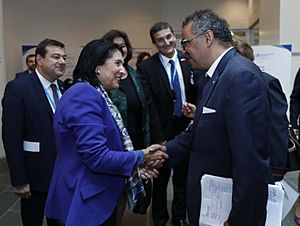
Tedros has overseen the WHO's management of the Kivu Ebola epidemic. He made early trips to both the Democratic Republic of Congo and China during the Kivu Ebola epidemic.
Tedros has identified universal health coverage as his top priority at the WHO. He campaigned on the issue and reiterated this focus in his first speech as Director-General and throughout the 72nd Session of the UN General Assembly. In October 2017, he announced his senior leadership team, with women representing 60% of appointments. While Tedros received praise for his commitment to gender equality, he also received criticism for a lack of transparency. He appointed Tereza Kasaeva of the Russian Ministry of Health to lead the WHO Global Tuberculosis Program without soliciting civil society input; days before the appointment, civil society organizations had published an open letter calling for a competitive, open process to identify the Program's new director.
On 18 October 2017, Tedros announced that he had chosen President Robert Mugabe of Zimbabwe to serve as a WHO Goodwill Ambassador to help tackle non-communicable diseases for Africa. He said Zimbabwe was "a country that places universal health coverage and health promotion at the centre of its policies to provide health care to all." Mugabe's appointment was severely criticised, with WHO member states and international organisations saying that Zimbabwe's healthcare system had in fact gone backwards under his regime, as well as pointing out Mugabe's many human rights abuses.
Second term (2022–present)
Reelection bid
Tedros made plans to seek re-appointment as early as May 2021. On 22 September 2021 Germany proposed him for a further term without opposition. In fact by 29 October he had been nominated by 28 nations: Austria, Bahrain, Barbados, Botswana, Cook Islands, Croatia, Denmark, Estonia, Finland, France, Germany, Greece, Hungary, Indonesia, Ireland, Kazakhstan, Kenya, Luxembourg, Malta, Netherlands, Oman, Portugal, Rwanda, Slovakia, Spain, Sweden, Tonga, and Trinidad and Tobago. He was poised for a second term since no opposing candidate has surfaced. He was re-appointed on 24 May 2022, unopposed for a term that was scheduled to begin on 16 August 2022.
Termination of regional director Takeshi Kasai
Under Tedros "zero tolerance" policy against misconduct, doctor Takeshi Kasai was dismissed in 2023 from his role as the Western Pacific regional director, the first time in WHO's history for someone at such a high position. An internal investigation had found Kasai to have engaged in public humiliation of staff members and making comments such as the "inferior culture" and "race" of Pacific countries that did not have the capacity to manage COVID-19 cases on their own. Several workers also said Kasai improperly shared sensitive vaccine information to help Japan, his home country. .....
In office
In February 2023, following the Turkey–Syria earthquakes, Ghebreyesus visited Antakya, Turkey, and Aleppo, Syria, to ensure more aid to the affected areas.
In 2023, he warned of the humanitarian impact of the war in Sudan, saying that 40% of the Sudanese population was suffering from hunger.
In December 2023, speaking about the situation in Afghanistan, Ghebreyesus said that 30% of the Afghan population was facing acute food insecurity, adding that "Close to 1 million children are severely malnourished and 2.3 million are suffering from moderate acute malnutrition. WHO needs $ 185 million to continue providing medicine and supporting hospitals to prevent more Afghan children and women from dying of malnutrition and the consequences of food insecurity."
Israel–Hamas war
Ghebreyesus condemned the attack by Hamas on Israel on 7 October 2023 and called for the release of all hostages.
On 29 October 2023, Ghebreyesus described as "deeply concerning" reports from the Palestinian Red Crescent that the al-Quds hospital had received an urgent evacuation warning and notice that it was "going to be bombarded" as "deeply concerning." He reiterated that it was "impossible to evacuate hospitals full of patients without endangering their lives". Hes said on X that he was "utterly shocked by reports of attacks on ambulances evacuating patients", adding that patients, health workers and medical facilities must always be protected.
In December 2023, he criticized Israel's blockade of the Gaza Strip, saying that "Resupplying health facilities has become extremely difficult and is deeply compromised by the security situation on the ground and inadequate resupply from outside Gaza."
In January 2024, Ghebreyesus described conditions in Gaza as "hellish". He called for a ceasefire and a "true solution" to the Israel-Palestinian conflict.
On 26 December 2024, Ghebreyesus was caught up in an Israeli airstrike on Sanaa International Airport in Yemen while he was visiting the country on official business. He later developed tinnitus from the explosions.
Personal life
Tedros is married and has five children. He is an Orthodox Christian.
Membership
- 2005–2009: Partnership for Maternal, Newborn & Child Health, co-chair
- 2005–2006: Stop TB Partnership, Coordinating board member
- 2007: 60th World Health Assembly, Vice President
- 2007: 56th Session of WHO Regional Committee for Africa, Chairman
- 2007–2009: Roll Back Malaria (RBM) Partnership, Chair
- 2008–2009: GAVI, the Vaccine Alliance, board member
- 2008–2009: High-Level Task Force for Innovative Financing for Health Systems, Member
- 2009–2011: Global Fund, Chair
- 2009–2010: Joint UN Programme on HIV/AIDS (UNAIDS), chair, Programme Coordinating Board
- 2009: The Aspen Institute, Ministerial Leadership Initiative, Aspen Global Health and Development at the Aspen Institute, Ministry Team
- 2011–2017: The Aspen Institute, Global Leaders Council for Reproductive Health, Member
- 2012–2014: Harvard University, Ministerial Leadership in Health Program, Advisory Board
- 2012–2013: Child Survival Conference, co-chair and co-host
- 2012–2017: Intergovernmental Authority on Development (IGAD), Executive Council Chair
- 2012–2017: High-Level Task Force for the International Conference on Population and Development (ICPD), Member
- 2013: African Union, Executive Council of Foreign Ministers of the African Union, Chair
- 2013: AIDS Watch Africa, Chair
- 2015–?: Tana High Level Forum on Security in Africa, board member
- Every Woman Every Child, Steering Group Member
Awards
- 1999: American Society of Tropical Medicine and Hygiene, Young Investigator of the Year
- 2003: Ethiopian Public Health Association, Young Public Health Researcher Award
- 2011: National Foundation for Infectious Diseases, Jimmy and Rosalynn Carter Humanitarian Award
- 2012: London School of Hygiene & Tropical Medicine, Honorary Fellow
- 2012: Wired magazine, One of 50 people who will change the world in 2012
- 2012: Yale University, Stanley T. Woodward Lectureship
- 2015: New African magazine, One of the 100 most influential Africans for 2015
- 2016: Women Deliver Conference, Women Deliver Award for Perseverance
- 2018: Umeå University, Faculty of Medicine, Honorary Doctorate
- 2019: Newcastle University, honorary degree
- 2020: African leadership magazine, African of the Year 2020 Award.
- 2021: University of Nottingham, honorary professorship
- 2021: Nizami Ganjavi International Medal
- 2022: Ubuntu Humanitarian Award, 6th Ubuntu Awards, Special Ubuntu Humanitarian Award
- 2023: University of Michigan, Thomas Francis Jr. Medal in Global Public Health
- 2024: The University of Glasgow, honorary degree.
- 2024: University of Groningen, Honorary doctorate degree
- 2024: University of Nicosia, Honorary Doctoral Degree [1]
See also
 In Spanish: Tedros Adhanom para niños
In Spanish: Tedros Adhanom para niños


